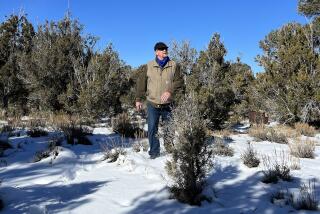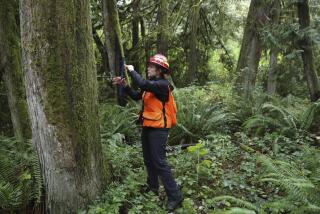Lumber Industry Tries a New Solution to a Knotty Problem : Wood: Instead of bulldozing the pesky western juniper, manufacturers are looking for profits in the prolific but ill-shaped tree.
- Share via
KLAMATH FALLS, Ore. — Meet the gnarly, water-sucking western juniper. Few people appreciate its outer beauty, even fewer its inner commodity.
*
Nevertheless, a market for juniper is slowly developing.
Ranchers in eastern Oregon, who have seen it multiply like weeds on their land, have historically bulldozed and burned the western juniper, which has been blamed for watershed degradation, loss of topsoil and reduction of biodiversity.
A focus group of wood products manufacturers, organized four years ago by the Winema National Forest, understood the desire of ranchers to see the western juniper go up in flames, but speculated that commercial uses for the aromatic hardwood might be developed.
“The group decided that if we could find ways to thin and utilize juniper, it would economically benefit everyone,” Winema National Forest resource specialist Larry Swan said.
The Western Juniper Commercialization Project was later formed, and biannual forums have been held to identify potential markets, create industry partnerships, and begin testing of raw materials.
“We wanted to make sure there was a market for the product. People who have worked with it have said, ‘Great. Send me 20 truckloads by tomorrow,’ ” said Oregon State University forest products extension agent Scott Leavengood, who recently compiled a juniper industry directory.
Leavengood points to the milling success in Missouri of Juniperus virginiana , better known as eastern red cedar, as an example of how the market can be developed.
Rustic furniture and products that use finger-jointed and edge-glued panels have the greatest potential because knots and defects can be cut out of wood, Leavengood said.
Other products include decking, flooring, interior paneling, cabinetry and novelties.
“People who are talking about juniper are realistic. They know it’s going to be difficult to get defect-free lumber for high-value products,” Leavengood said.
In April, Gov. John Kitzhaber announced that $109,300 in Oregon Lottery funds would be allocated this year to fund six juniper-related projects. They will include oil distillation, furniture market research and design, harvest systems comparisons, log storage and debarking comparisons, drying schedules and a newsletter.
Testing at nearly every stage of production has been necessary due to the properties of the tree: Large numbers of limbs on western juniper make harvesting labor-intensive and costly; the taper of the logs, much like a carrot, causes a large portion of the material to go to waste after sawing unless it is otherwise utilized; and knots and voids in the wood tend to cause checking and splitting during the drying process.
Trial juniper runs in which sample panels were glued together were held at Modoc Lumber Co. earlier this year.
“The tests showed we needed to do things a little differently, but they also showed promise,” Modoc Lumber Special Projects Director Ron Loveness said.
Weyerhaeuser has conducted strength and moisture tests on hardboard that was produced with a mixture of pine and juniper chips. The hardboard is used to make exterior siding.
“It has performed very well in our product,” said Weyerhaeuser Product Flow Manager Bob Vinson, who said the company has bought about 3,000 tons of juniper chips since May from three suppliers in the region. The company processes about 100,000 bone-dry tons of wood chips annually.
“We are looking to expand in the juniper market. We may only be taking in a small percentage of juniper chips right now, but it will grow. We’re looking to increase our production by about 20 percent in the next three years,” Vinson said.
High Desert Wood Products Inc. of Dairy, Ore., is a supplier of juniper chips. Owner Howard McGee, who has been using a classified advertisement to let people know he is purchasing juniper logs, plans to expand his operation from chips to sawing juniper logs for higher-value lumber.
“We have lived among juniper all our lives; it’s time to see something come of it,” McGee said.
More to Read
Inside the business of entertainment
The Wide Shot brings you news, analysis and insights on everything from streaming wars to production — and what it all means for the future.
You may occasionally receive promotional content from the Los Angeles Times.










